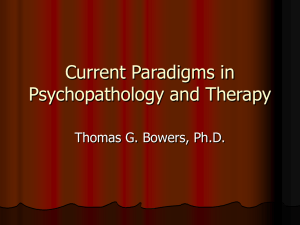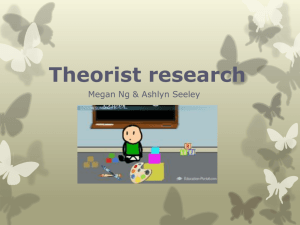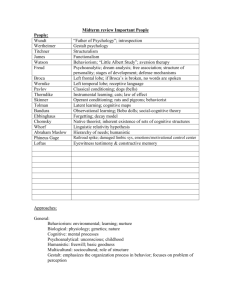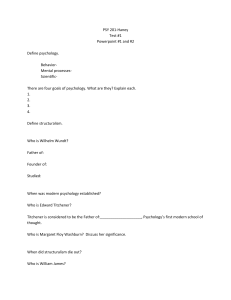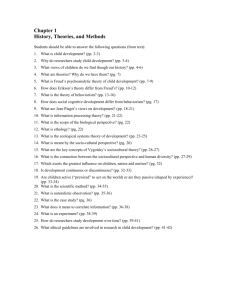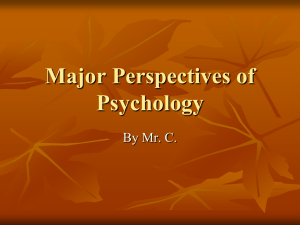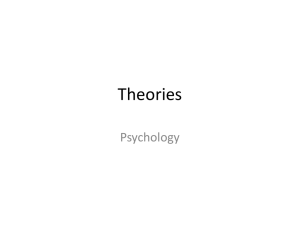Seven Approaches - Doral Academy Preparatory
advertisement
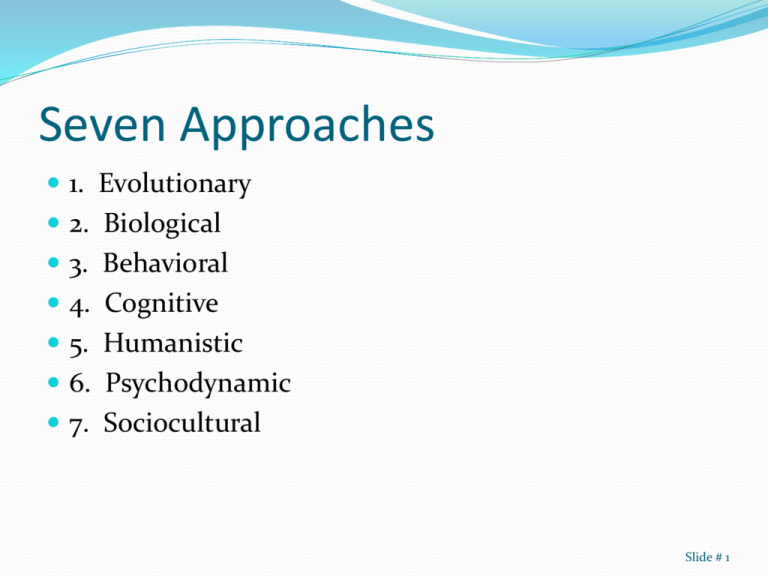
Seven Approaches 1. Evolutionary 2. Biological 3. Behavioral 4. Cognitive 5. Humanistic 6. Psychodynamic 7. Sociocultural Slide # 1 Overview of Each Approach Biological: Focuses primarily on the activities of the nervous system, the brain, hormones, and genetics Psychodynamic: Emphasizes internal, unconscious conflicts; the focus is on sexual and aggressive instincts that collide with cultural norms Slide # 2 Overview (cont.) Behavioral: Examines the learning process, focusing in particular on the influence of rewards and punishments Evolutionary: Investigates how primal survival instincts can influence behavior Slide # 3 Overview (cont.) Cognitive: Focuses on the mechanisms through which people receive, store, and process information Humanistic: Emphasizes an individual’s potential for growth and the role of perception in guiding mental processes and behavior Slide # 4 Overview (cont.) Sociocultural: Explores how behavior is shaped by history, society, and culture Slide # 5 The Evolutionary Approach Functionalism Why we do what we do The influence of Charles Darwin Slide # 6 The Biological Focus The brain and central nervous system Sensation and perception Autonomic nervous system Endocrine system Heredity and genetics Slide # 7 Biological Focus (cont.) The physiological basis of how we learn and remember The sleep-wake cycle Motivation and emotion Understanding the physical bases of mental illnesses such as depression and schizophrenia Slide # 8 Howard Gardner Studied brain damage and neurological disorders Created the theory of multiple intelligences The different types of intelligence Slide # 9 Hans Eysenck Importance of genetics Intelligence is inherited Personality has a biological component Hierarchy of personality traits Slide # 10 Roger Sperry Split-brain surgery Techniques for measuring the different functions of the hemispheres of the brain Application: epilepsy Slide # 11 David McClelland Achievement and motivation Characteristics of high-achieving people Slide # 12 Stanley Schachter Studied eating behavior Manipulation of external cues Slide # 13 Elizabeth Loftus Study of memory Eyewitness testimony Myth or repressed memories? Slide # 14 The Psychodynamic/ Psychoanalytic Approach Examines unconscious motives influenced by experiences in early childhood and how these motives govern personality and mental disorders Free association and psychoanalysis Slide # 15 Sigmund Freud The “Father of psychoanalysis” The second mind, unconscious Repression, free association, dream analysis Theory of personality Slide # 16 Carl Jung Analytical psychology Personal and collective unconscious Archetypes Slide # 17 Alfred Adler Individual psychology Striving for perfection, compensation, and the inferiority complex Ordinal position Slide # 18 Anna Freud Founder of child psychoanalysis Defense mechanisms Slide # 19 Erik Erikson A neo-Freudian A strong need for social approval Psychosocial development and crises Slide # 20 The Humanistic Approach Slide # 21 The “Third Force” in Psychology Rejected the views of both behaviorism and psychoanalytic thought Free will and conscious choice Slide # 22 The Humanists Revolt Humanists felt that both behaviorist and psychoanalytic perspectives were dehumanizing Humanists believed that behaviorism and psychoanalysis ignored personal growth An optimistic view of human potential Slide # 23 More Differences Choices are not dictated by instincts, the biological process, or rewards and punishments The world is a friendly, happy, secure place Slide # 24 Carl Rogers In the 1940s, humanism began to receive attention because of Rogers Human behavior is governed by each individual’s sense of self The drive for personal growth Slide # 25 Application of the Humanistic Approach Greatest contribution comes in the area of therapy Client-centered therapy Slide # 26 Abraham Maslow Hierarchy of needs, theory of motivation Becoming fully selfactualized Emphasis on uniqueness Slide # 27 Albert Ellis Creator of rationalemotive therapy Self-defeating thoughts cause depression and anxiety “I must be loved by all” is an unrealistic notion Slide # 28 Criticisms of the Humanistic Approach Not all people have the same needs or meet them in a hierarchical fashion The humanistic approach is vague and unscientific Slide # 29 The Cognitive Perspective Studies people’s mental processes in an effort to understand how humans gain knowledge about the world around them Cognito = Latin for “knowledge” How we learn, form concepts, solve problems, make decisions, use language Slide # 30 What Is Cognition? An “unobservable” mental process The study of consciousness, physiological determinants of behavior 1950s-1960s: new understanding of children’s cognitive development Slide # 31 Advocates of the Cognitive Approach The manipulation of mental images can influence how people behave The focus is not on “overt” behavior The cognitive method can be studied objectively and scientifically Slide # 32 Edward Titchener Structuralism The mind is structured by breaking down mental experiences into smaller components Slide # 33 Jean Piaget Child psychologist Educational reforms Children are not “blank slates” Slide # 34 Noam Chomsky Infants possess an innate capacity for language Transformational grammar Slide # 35 Albert Bandura Social Cognitive Theory: a form of learning in which the animal or person observes and imitates the behavior of others Cognitive learning theory/expectancies Slide # 36 Lawrence Kohlberg How children develop a sense of right and wrong He borrowed from Piaget Moral questions Slide # 37 Albert Ellis RET/Changing unrealistic assumptions People behave in rational ways Role playing Slide # 38 Hans Eysenck Trait theory and personality development Slide # 39 Aaron Beck A cognitive therapist Maladaptive thought patterns cause a distorted view of oneself that leads to problems Slide # 40 Stanley Schachter “Misery loves company” Anxiety and companionship Slide # 41 What Is Behaviorism? Focuses on observable behavior and the role of learning in behavior Behaviorism continues to influence modern psychology The role of reward and punishment in learning Slide # 42 Applications of Behaviorism Aggression Drug abuse Self-confidence issues Overeating Criminality Slide # 43 John Watson The father of behaviorism Psychology should become a science of behavior Environment molds the behavior of us all Slide # 44 Ivan Pavlov Nobel Prize winner Psychic reflexes Classical conditioning Slide # 45 B.F. Skinner A strict behaviorist Operant conditioning: rewards and punishments Slide # 46 Edward Thorndike Studied animal thinking and reasoning abilities The puzzle box, instrumental learning Laid the groundwork for operant conditioning Slide # 47 The Sociocultural Approach Slide # 48 Why Has Psychology’s Focus Been So Narrow? Cross-cultural research is costly, difficult, and time consuming Psychology has traditionally focused on the individual, not the group Cultural comparisons may foster stereotypes Slide # 49 Sociocultural Issues Ethnicity Gender issues Lifestyles Income The influence of culture on behavior and the mental process Slide # 50 Stanley Milgram Classical experiment on obedience to authority Slide # 51 Solomon Asch 1950 conformity study showed that people tend to conform to other people’s ideas of truth even when they disagree with those ideas Slide # 52 Harry Harlow Challenged drivereduction theory Surrogate mothers Contact comfort Slide # 53 Albert Bandura Social learning and modeling Learning and aggression Slide # 54
